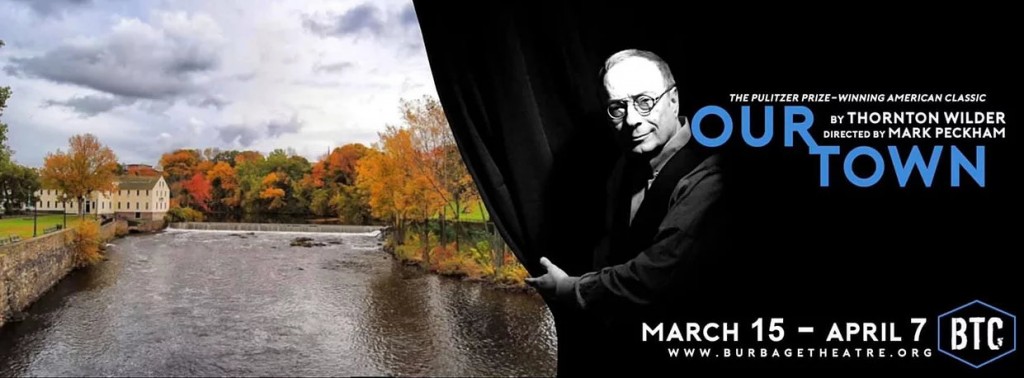
Our Town by Thorton Wilder is a deceptively simple play to perform, famously requiring neither set nor scenery and few props, and for this reason is popular as a staple of local theater groups – who often perform it badly. Wilder’s stated intent was to strip theater to its essence, meaning that the burden falls squarely upon the actors, hiding behind nothing. The audience is always understood to be watching the play in 1938 when it was written (and won the Pulitzer Prize for drama), and its three acts are set looking back, respectively, to 1901, 1904, and 1913.
Burbage made an interesting choice in the program to list the titles of Act I (“Daily Life”) and Act II (“Love and Marriage”), but to leave the title blank for Act III (“Death and Eternity”). Is anyone fooled by that? Burbage director Mark Peckham emphasizes the sharp break in tone between the second and third acts by requiring the entire audience to exit the theater to the lobby during the second intermission so that the seats can be rearranged facing the same direction after the first two acts are performed in the round; this works remarkably well.
The most critical role in the play is that of the Stage Manager, because he is consciously aware that he is a character in a play and interacts with the audience directly as well as the other characters. The role has been essayed by everyone from Orson Welles to Spalding Gray, which is telling because much of what he says is monologue. Burbage’s Stage Manager is Vince Petronio, who hits exactly the right note of matter-of-fact calmness and simplicity that prevents the material from falling into the depressing and the maudlin; Wilder himself warned against “sentimentality.”
There are 18 credited roles in the Burbage production listed alphabetically by the last names of the actors, but the core roles (in addition to the Stage Manager) are Emily Webb (Valerie Westgate) and George Gibbs (Andrew Iacovelli) who grow up living across the street from each other and eventually marry, and their parents. Frank Gibbs (David Tessier) is the town’s doctor, and his wife Julia Gibbs (Emily Lewis) is a homemaker who urges him to take a vacation. Charles Webb (David Rabinow) is the editor of the town’s newspaper, and his wife Myrtle Webb (Melissa Sciara Penick) is the sort of homemaker upon whom everyone in the neighborhood drops in on to be fed.
Westgate and Iacovelli are excellent, living up to the high standard set by Petronio, especially in their principal scenes together, the first where she helps him with homework by talking back and forth between their second-story windows and the second where they go out for ice cream and realize after all these years they are no longer children but have developed mutual romantic interest. Tessier carries a demanding character whose outlook is precisely opposite to that endorsed by the play. Rabinow carries a character who, ironically for a journalist, often tries to avoid saying much. Lewis and Penick work well as a team, the two mothers eventually seeing their children marry each other.
Notable secondary roles include the Crowell brothers (both played by Brian Kozak), who deliver the town newspaper; we are told that the older brother, Joe, graduates at the top of his class from “Massachusetts Tech” (intended as a reference to MIT, then commonly known as “Boston Tech”) before being killed as a soldier in the World War: “All that education wasted.” Simon Stimson (Andrew Stigler) is the church choir director and organist, whose alcoholism is widely discussed with a fatalistic outlook mirroring his own. Louella Soames (Paula Faber) is one of those more worried about the effects of Stimson’s alcoholism than about Stimson himself, wondering why the pastor doesn’t fire him. Professor Willard (Liz Hallenbeck) is invited by the Stage Manager to address the audience, giving some background on the town, but comically introduces largely irrelevant and uninteresting facts about the geology of the area before being gently nudged by the Stage Manager into a more productive direction. Howie Newsome (Jona Cedeno) delivers the milk every morning, aided by his horse Bessie that he interacts with but is only mimed for the audience, a subtle but important contribution to the deliberate meta-theatrical artifice. Jo Stoddard (Michelle L. Walker) is the undertaker, who gives a short but consequential soliloquy about the nature of that work.
Our Town depends upon its actors to create a world for the audience out of almost nothing, which is why it is so demanding to perform. Burbage director Mark Peckham not only understands that challenge, but gets his actors on board in a performance far exceeding expectations of local theater. Done correctly, as Burbage does, Our Town shines as the truly innovative work of theater that it was immediately seen to be in its initial production. The end of the interwar period, just before the outbreak of a Second World War that had been unthinkable, and even then remained unimaginable, was a unique point of reflection about the comparable period immediately preceding the unspeakable horror of the First. The sense of dread and foreboding, unfocused and unnameable, in 1938 echoed that of 1913: Wilder’s Act III, where we receive advice and perspective from the dead, is intended as the antidote.
Our Town, by Thornton Wilder, directed by Mark Peckham, Burbage Theatre Company, 249 Roosevelt Ave, Pawtucket. Three acts, 2h including two intermissions. Through Apr 7. Refreshments available. Web: burbagetheatre.org/our-town E-mail: info@burbagetheatre.org Tel: 401-484-0355 Tickets: app.arts-people.com/index.php?ticketing=burb Facebook: facebook.com/events/428291794420078

